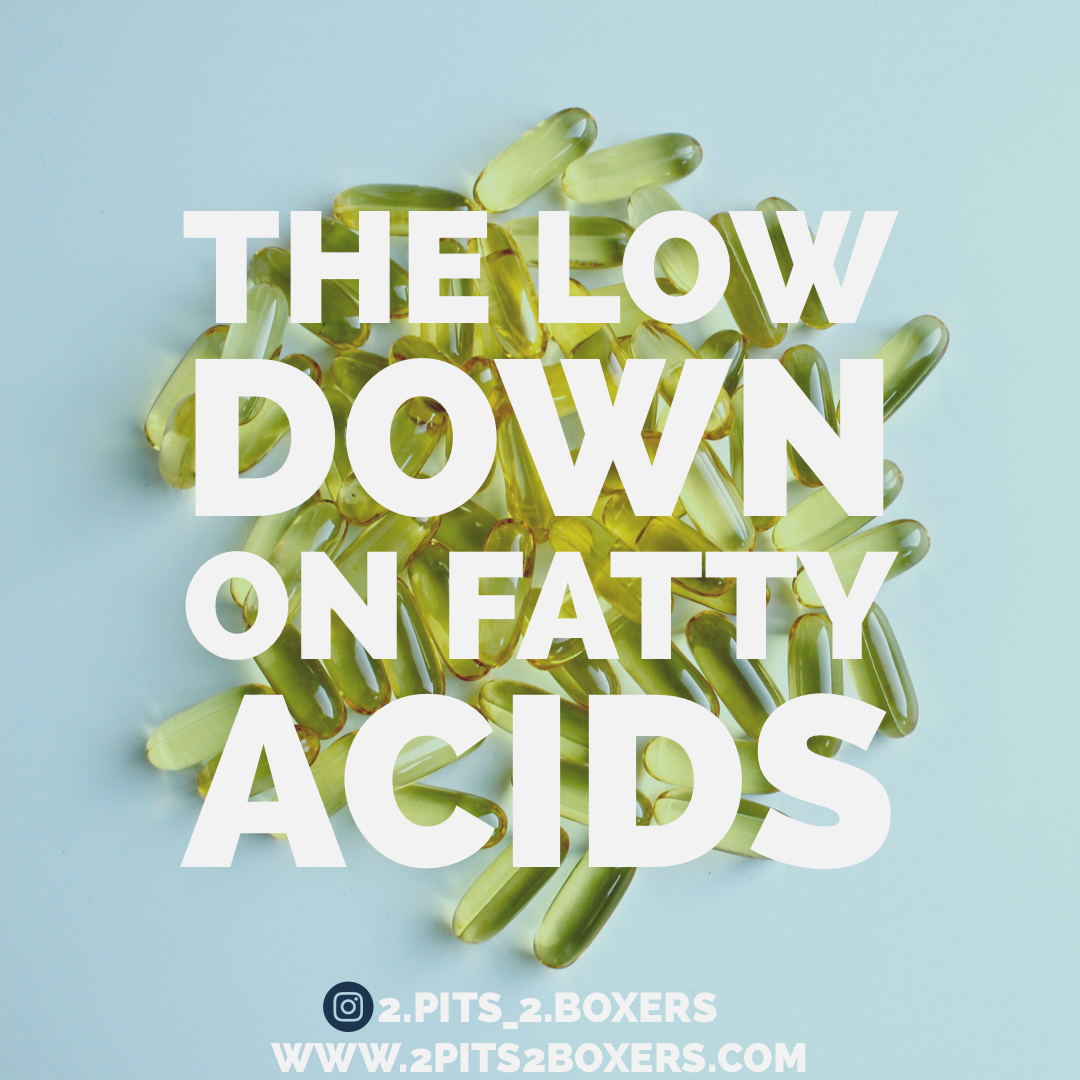The Low Down on Fatty Acids
What are Fatty Acids?
Fatty acids are part of dietary fat in a canines diet, also known as lipids. Fatty acids are very important for canines of all life stages, and are considered to be an essential nutrient in a canines diet (EFA). Essential fatty acids are a source of energy, and provide nutrients that canines need for healthy function and support of many systems and processes in the body.
Roles of Fatty Acids
- Important source of energy
- Skin and coat health
- Maintain strong joints
- Retinal development
- Cognitive development and support
- Heart health
- Support of kidney function
- Help with inflammation
- Inhibit excessive blood clotting
Omega 3 and Omega 6
Essential fatty acids are in two different groups, Omega 3 and omega 6. Omega 3 and omega 6 cannot be produced by dogs themselves, so it is very important that they get these fatty acids through their diets through whole food sources. Both of these fats work together in the body to control inflammation. It is important to make sure dogs receive a ratio of both groups of omegas for optimal health.
Omega 6
Omega 6 consist of Linoleic acid (LA), and arachidonic acid (AA). LA is required for dogs. Omega 6 provides protection against environmental allergens and pathogens by providing a barrier on the skin (healthy coat). Most Omega 3 are from plant sources.
Many commercial kibble diets provide fatty acids, but they contain an over abundance of omega 6. Too much omega 6 can make inflammatory ailments worse for your dog (this is one of the many reasons I feed Dr. Harvey’s, so I am in complete control of the amount and kind of oil and protein my dogs get).
Omega 3
Omega 3 consists of, alpha-linoleic acid (ALA), eicosapentaenoic acid (EPA), and docosahexarnoic acid (DHA). Omega 3 is important in development and maintaining a normal inflammatory response. It is important to remember that inflammatory responses are more than just what we can see with itchy skin, all organ systems can suffer from inflammatory responses. Having too much Omega 3 can cause immune dysfunction. Omega 3 is a long chain amino acid, which can make this supplement go bad quickly.
Sources of Fatty Acids
This is where I tend to get a little picky. Sourcing is important for many reasons, one of the biggest being the quality of your product relies on where the product is coming from. Ethical sourcing is also very important to me with plant and animal sources.
Omega 6 is found in many plant sources and animal fat. I typically use a flax and coconut oil to provide my dogs Omega 6 in their diet. I keep it pretty simple with flax and coconut, and rotate these oils in their diet a couple of times a week. Coconut oil is one of the richest natural sources of LA.
Omega 3 , specifically DHA and EPA I spend more time looking into. I try to feed my dogs fresh fish, but when I can’t I make sure I use a high quality fish oil supplement from a company with good quality control. Bonus points if the fish is wild caught from a sustainable area. I also like using fish that are lower on the food chain since they are lower in toxins. I also like to keep my fish oils in the fridge to reduce oxidation and keep them fresh longer. You can also keep them in a cool climate controlled area to keep them fresh longer.

What I Use (rotation and variety is key):
- Barlean’s Flax Oil for Animals
- Dr. Harvey’s Health and Shine fish oil capsules, salmon and kill, and Health and Shine Omega 3 (these are new varieties)
- Answers Fermented Fish Stock
- Coco therapy Coconut Oil
When I changed my dogs to a fresh food diet, I saw significant improvements in their overall health. Once I dove into fatty acids, I was able to even better support my crew. Through rotating different oils, I have been able to better support symptoms of arthritis, itchy skin, kidney function, and cognitive function for one of my seniors. Not to mention their coats are beautiful!
Side Notes
It is important to make sure that you feed your dogs a healthy balanced diet for optimal digestibility of fatty acids. Just like humans, dogs thrive on getting as many nutrients through whole food sources as possible.
When using oils as a supplement in your dogs diet, don’t overdo it. Oils can cause some GI upset and diarrhea if used in large quantities. I like to follow the manufactures recommendations for the amount based off of the weight and age of my dogs.
Feed what works for you and your pups. If your pups don’t like pills and capsules, utilize a liquid/stock or find pills that can be opened up onto your pups food. Many dogs who normally don’t do well with pills might enjoy fish oil pills since they taste so yummy to them on the inside. Be careful of using human fish oil pills as they can have added sweeteners that can be toxic to dogs.
Disclaimer: After reaching out to Dr. Harvey’s about the tremendous health benefits my dogs have seen since using Dr. Harvey’s products and supplements, they have since given me free food, treats, supplements and grooming products for my honest feedback and opinion. I am thrilled about this opportunity, as I used Dr. Harvey’s products prior to our partnership. This blog post and/or social media content may not express the opinion of Dr. Harvey’s. This blog post/social media content in no way is meant to diagnose or treat your animals health. Please consult your veterinarian for all medical conditions and health ailments of your pet.


